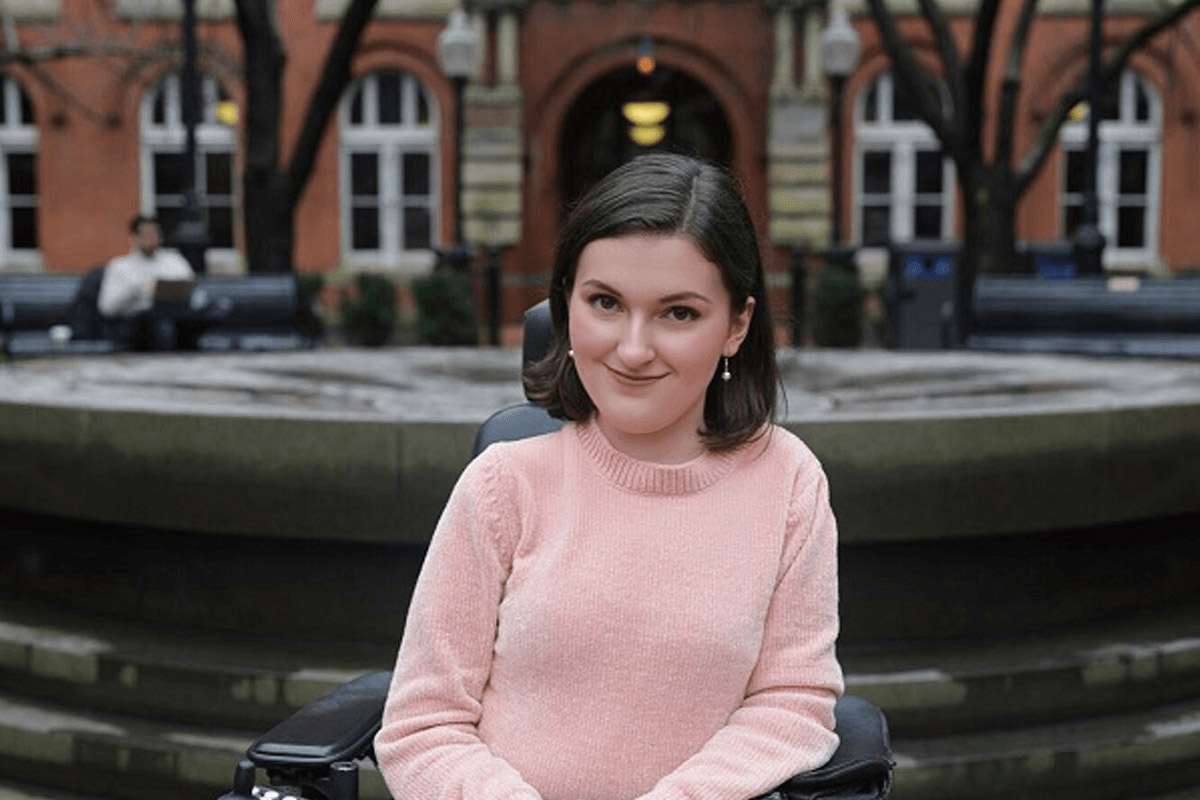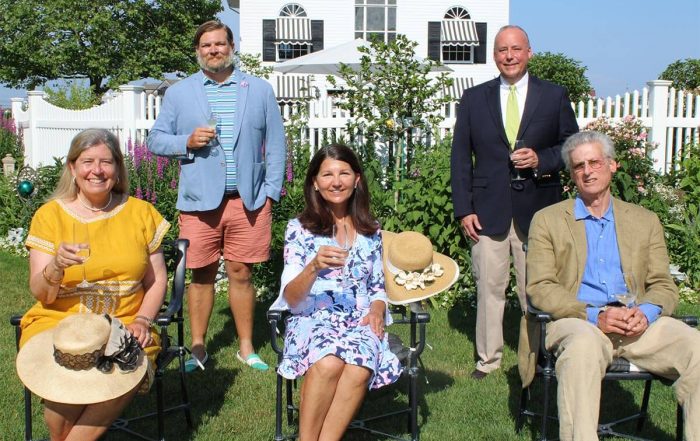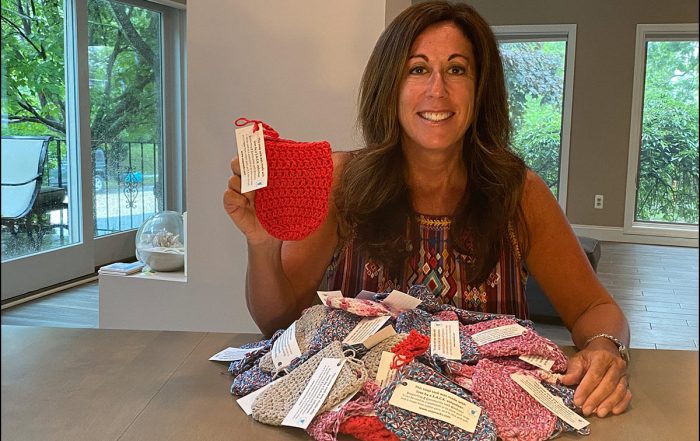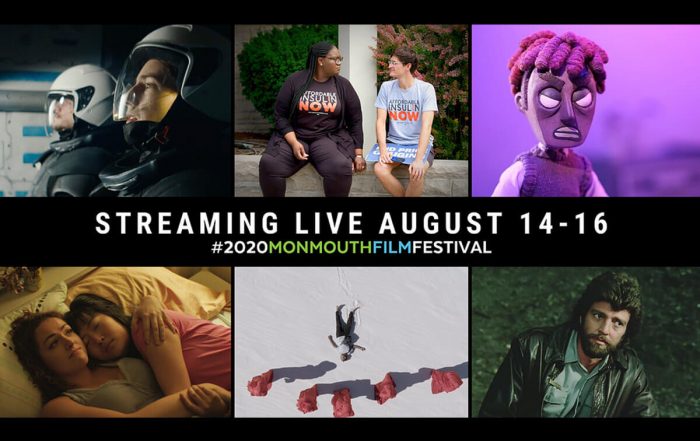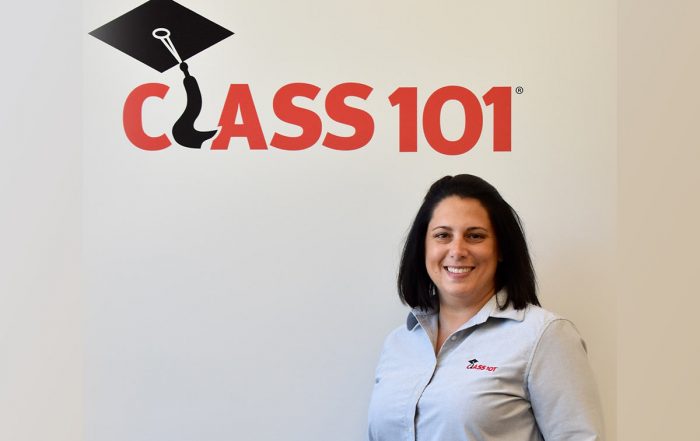“It took me a long time to consider myself ‘disabled.’ I know that sounds strange coming from someone who, wheelchair and all, is a veritable poster child for the term.”
Meet Anna Landre, a recent valedictorian of Freehold High School and now a junior in the prestigious School of Foreign Affairs at Georgetown University. Anna calls herself a “disabled woman” but challenges us to view disabilities not as afflictions or defects to overcome, but rather as a normal part of human diversity. Anna has spinal muscular atrophy type 2 which causes progressive muscle weakness and breathing difficulties. She requires a wheelchair and 16 hours of assistance each day to aid her breathing, her use of the bathroom, and getting in and out of bed. Georgetown nursing students assist her, and this successful home health arrangement allows her to live independently, attend classes, and maintain a 3.9 GPA all while writing a column, Discussing Disability, for Georgetown’s publication The HOYA.* What began as a report on Anna’s intrepid fight with her insurance company to preserve her life-saving care, has evolved into an eye-opener on the perceptions and myths of what it means to be disabled. She is an eloquent and thoughtful spokesperson for what she deems an often-overlooked minority.
“I stopped drinking coffee in the morning,” recalled Anna. “It wasn’t because I wanted a caffeine detox or a switch to tea. Instead, my insurance company was threatening to cut my aide services. I was trying to reduce my drinking to a minimum, preparing myself for the fact that soon I might not have someone to help me to the bathroom when I needed it. For disabled Americans like me, devastating cuts in care are almost routine.” The dreaded devastating cuts did arrive last year. Despite no changes in her circumstances, the insurance company declared it was slashing the permitted aide services to 10 hours per day. It did not matter that the cut would require Anna to leave her college program, her internship opportunities, and her goal of a productive, independent life. “Each battle upends my life and that of my family,” said Anna. “I had to appear in court to defend my need for aide services against the testimony of a team of corporate lawyers sent by my insurance company. In what was possibly one of the most humiliating situations of my life, I was interrogated about every nuance of my disability in front of a courtroom, desperately hoping that the judge — who has no medical expertise — would believe me when I explained my own needs. The worst part is knowing fights like this will never end; for the rest of my life, I’ll be dreading a letter in the mail telling me that my care is gone for good.”
The administrative law judge did overturn the cut and ordered the insurance company to reinstate the 16 hours. The relief was short-lived. The New Jersey Division administering the Medicaid program reversed the judge’s ruling and reinstated the 10-hour maximum. This action precipitated Anna’s year-long battle, challenging the reversal and exposing the processes too many other students also face. A settlement was finally offered restoring her care, but Anna was reluctant to accept it because she worried others would not benefit. She signed on only after Senator Vin Gopal (Monmouth County) urged her to accept the deal, promising to pursue legislation to end the problem.
What does Anna feel our society gets wrong about being “disabled”? When reflecting on growing up with the disabled label, Anna realized a disability is not viewed as one’s identity. “The word carried a heavy negative connotation, implying someone who was to be pitied, cared for, and protected,” shared Anna. “It wasn’t an identity; it was a defect. Disabled people are America’s largest minority. For other minority groups, we tend to understand that their adversity is caused by external factors. For disabled people, the source of adversity is assumed to be internal, caused by some sort of medical problem. Many difficulties that disabled people face are not inherently caused by their disabled body, but instead by their environment. For example, the fact that I can’t walk is a problem largely because I can’t use stairs and thus do not have access to certain places…In other words, stop feeling sorry for me because I can’t walk upstairs and start helping me build a ramp instead.”
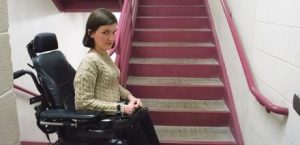 Anna pointed out the power of the media plays a large role in shaping our perceptions. “Pitiable and pathetic disabled characters exist either to convey another character’s charity or an emotional lesson for the audience.” Or, there is what Anna describes as “the super crip” stereotype, whose narrative is consumed by the pursuit of ‘overcoming’ the disability, implying that a person must eliminate disability to achieve success. Anna believes true acceptance of disabilities may gain ground if the media begins to help reshape the narrative.
Anna pointed out the power of the media plays a large role in shaping our perceptions. “Pitiable and pathetic disabled characters exist either to convey another character’s charity or an emotional lesson for the audience.” Or, there is what Anna describes as “the super crip” stereotype, whose narrative is consumed by the pursuit of ‘overcoming’ the disability, implying that a person must eliminate disability to achieve success. Anna believes true acceptance of disabilities may gain ground if the media begins to help reshape the narrative.
Through her own life choices and experiences, Anna demonstrates her belief that success is not incompatible with disability. At Georgetown, she and others are working to create a Disability Alliance on campus to build community among disabled people and allies, practice activism, and educate others. And there is no summer break from action. She spent this past summer in Brazil in a cultural and language immersion program through the US State Department’s Critical Language Scholarship program. In Brazil, Anna experienced many access issues but found the people to be very helpful. Her favorite parts of the experience were perfecting her Portuguese and working with a non-profit focused on advocacy and services for the disabled. The summer before, Anna interned with a public relations agency in DC. This led to another legal issue. “The internship was my first paid job, and getting a paycheck meant that I almost lost all my Medicaid services. I’ll be in quite a dilemma when I graduate from college–do I start an entry-level job with an income that will be too high for me to legally keep my disability services but still too low to actually allow me to cover those costs on my own, or do I just forego ever having a paid job, essentially throwing away a degree (which I’ve taken loans to fund!)? I’m racing against the clock to try and change these regulations before I graduate.”
What is next for Anna? “I’d like my future career to entail fomenting the inclusion of people with disabilities in both the United States and developing countries, particularly in Latin America. People with disabilities are the world’s largest minority, and populations are even greater in developing countries. And since one of the most successful legislative exports of the US is the Americans with Disabilities Act, our country is uniquely positioned to help. Though, as I learned in Brazil, we also have a lot to learn from other countries.”
Recommended for you
Kids with Cancer Need Help… Here’s What You Can Do
The daily burdens thrust upon families who are battling pediatric cancer are [...]
Monmouth County Historical Association Virtually Celebrates Annual Garden Party
FEATURED PHOTO: MCHA Executive Committee: (l to r front row) Kathy Jones (2nd [...]
Meet Your Neighbor: Stacy Wiener
FEATURED PHOTO: This is where caption text will go for featured photo. As [...]
Monmouth Film Festival Redefines the Festival Experience this August
As film and theater folk like to say, the show MUST go on, [...]
Meet Your Neighbor: Laura Ciccone, Educational Advisor
FEATURED PHOTO CREDIT: Cathy Padilla Laura Ciccone lives in Lincroft with her [...]
Pet Celebs: August 2020
Your pets can be celebrities too. Send in a photo to info@communitymagazinenj.com! [...]



